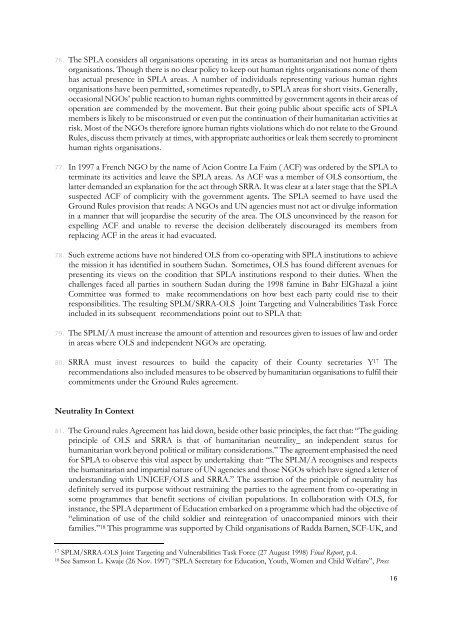105 - Sudan - Approaches to Armed Groups Kuol ... - The ICHRP
105 - Sudan - Approaches to Armed Groups Kuol ... - The ICHRP
105 - Sudan - Approaches to Armed Groups Kuol ... - The ICHRP
You also want an ePaper? Increase the reach of your titles
YUMPU automatically turns print PDFs into web optimized ePapers that Google loves.
76. <strong>The</strong> SPLA considers all organisations operating in its areas as humanitarian and not human rights<br />
organisations. Though there is no clear policy <strong>to</strong> keep out human rights organisations none of them<br />
has actual presence in SPLA areas. A number of individuals representing various human rights<br />
organisations have been permitted, sometimes repeatedly, <strong>to</strong> SPLA areas for short visits. Generally,<br />
occasional NGOs’ public reaction <strong>to</strong> human rights committed by government agents in their areas of<br />
operation are commended by the movement. But their going public about specific acts of SPLA<br />
members is likely <strong>to</strong> be misconstrued or even put the continuation of their humanitarian activities at<br />
risk. Most of the NGOs therefore ignore human rights violations which do not relate <strong>to</strong> the Ground<br />
Rules, discuss them privately at times, with appropriate authorities or leak them secretly <strong>to</strong> prominent<br />
human rights organisations.<br />
77. In 1997 a French NGO by the name of Acion Contre La Faim ( ACF) was ordered by the SPLA <strong>to</strong><br />
terminate its activities and leave the SPLA areas. As ACF was a member of OLS consortium, the<br />
latter demanded an explanation for the act through SRRA. It was clear at a later stage that the SPLA<br />
suspected ACF of complicity with the government agents. <strong>The</strong> SPLA seemed <strong>to</strong> have used the<br />
Ground Rules provision that reads: A NGOs and UN agencies must not act or divulge information<br />
in a manner that will jeopardise the security of the area. <strong>The</strong> OLS unconvinced by the reason for<br />
expelling ACF and unable <strong>to</strong> reverse the decision deliberately discouraged its members from<br />
replacing ACF in the areas it had evacuated.<br />
78. Such extreme actions have not hindered OLS from co-operating with SPLA institutions <strong>to</strong> achieve<br />
the mission it has identified in southern <strong>Sudan</strong>. Sometimes, OLS has found different avenues for<br />
presenting its views on the condition that SPLA institutions respond <strong>to</strong> their duties. When the<br />
challenges faced all parties in southern <strong>Sudan</strong> during the 1998 famine in Bahr ElGhazal a joint<br />
Committee was formed <strong>to</strong> make recommendations on how best each party could rise <strong>to</strong> their<br />
responsibilities. <strong>The</strong> resulting SPLM/SRRA-OLS Joint Targeting and Vulnerabilities Task Force<br />
included in its subsequent recommendations point out <strong>to</strong> SPLA that:<br />
79. <strong>The</strong> SPLM/A must increase the amount of attention and resources given <strong>to</strong> issues of law and order<br />
in areas where OLS and independent NGOs are operating.<br />
80. SRRA must invest resources <strong>to</strong> build the capacity of their County secretaries Y 17 <strong>The</strong><br />
recommendations also included measures <strong>to</strong> be observed by humanitarian organisations <strong>to</strong> fulfil their<br />
commitments under the Ground Rules agreement.<br />
Neutrality In Context<br />
81. <strong>The</strong> Ground rules Agreement has laid down, beside other basic principles, the fact that: “<strong>The</strong> guiding<br />
principle of OLS and SRRA is that of humanitarian neutrality_ an independent status for<br />
humanitarian work beyond political or military considerations.” <strong>The</strong> agreement emphasised the need<br />
for SPLA <strong>to</strong> observe this vital aspect by undertaking that: “<strong>The</strong> SPLM/A recognises and respects<br />
the humanitarian and impartial nature of UN agencies and those NGOs which have signed a letter of<br />
understanding with UNICEF/OLS and SRRA.” <strong>The</strong> assertion of the principle of neutrality has<br />
definitely served its purpose without restraining the parties <strong>to</strong> the agreement from co-operating in<br />
some programmes that benefit sections of civilian populations. In collaboration with OLS, for<br />
instance, the SPLA department of Education embarked on a programme which had the objective of<br />
“elimination of use of the child soldier and reintegration of unaccompanied minors with their<br />
families.” 18 This programme was supported by Child organisations of Radda Barnen, SCF-UK, and<br />
17 SPLM/SRRA-OLS Joint Targeting and Vulnerabilities Task Force (27 August 1998) Final Report, p.4.<br />
18 See Samson L. Kwaje (26 Nov. 1997) “SPLA Secretary for Education, Youth, Women and Child Welfare”, Press<br />
16
















